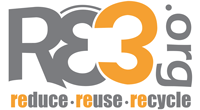From the National Recycling Coalition with my comments throughout. At the National Recycling Congress in October 2007, NRC unveiled the brand platform that will guide the development of NRC's national consumer campaign scheduled to launch in 2008. [Is a “national consumer” just anyone in any town? What typical age is a “national consumer?”] The new platform was the product of consumer research NRC conducted examining the drivers of consumer recycling behavior, with a focus on the differences and similarities between "Sometimes" and "Always" recyclers. [I think it will be great if we can get the low-hanging fruit, the “sometimes” recyclers to recycle more, but we can’t stop there. What is the long-term plan?]
The project began with a comprehensive review of current qualitative and quantitative research on the subject of consumer recycling behavior. The research team reviewed 95 studies and articles garnered from members, academia and government. Review of the existing research revealed that many of the positive rational drivers of consumer behavior all benefited society as a whole rather than the individual, hence recycling is considered to be primarily a moral activity - more a matter of right and wrong rather than cost and benefit. [I don’t disagree with this thought, but it all depends on whom the message is intended for. Businesses are motivated by cost and benefit and not the fact that it is just the right thing to do.] Since recycling is perceived as an ethical activity, NRC focused its primary research on the in-depth exploration of emotional and aspirational drivers for “Sometimes” recyclers and how they differ from “Always” recyclers.
NRC's primary research revealed that “Always” recyclers had a deep-rooted, emotional connectedness to the behavior of recycling. In contrast, “Sometimes” recyclers use rational justification for recycling while constantly seeking information they hope will either relieve them from recycling all together or that will make them believe their actions matter. [So will we get this information from NRC to help bridge this gap?]
NRC's analysis identified four main behavioral drivers: the sense of accomplishment; the desire to be seen as a role model; the need for control; and the hope for belief. In order for these drivers to be motivating, NRC determined that they needed to have the underpinnings of optimism - that campaigns and messages of negativity, cynicism and shame, were not strong, lasting motivators. [This is very true. Many campaigns have been using the tactic such as rewards and incentives for a few years versus making people feel guilty for not recycling.]
With this information, NRC developed a brand platform designed to make the act of recycling an act of optimism for “Sometimes” recyclers to connect them to their community and feel accomplished when the behavior is practiced.

No comments:
Post a Comment